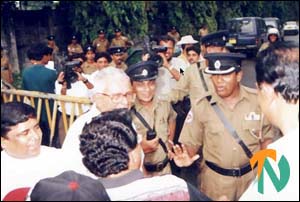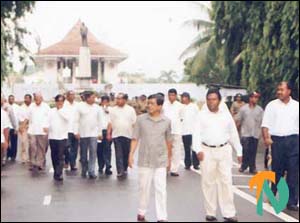Censorship seen heralding authoritarian rule
[TamilNet, Friday, 05 May 2000, 09:12 GMT]
Sri Lanka's new censorship laws will lead to an authoritarian rule in the country, a press freedom organization said Friday. The Free Media Movement said the government was using Sri Lanka's ongoing conflict as a cover for its "repressive political project".
The text of the FMM's press release follows:
"Free Media Movement is perturbed by the imposition of a new set of rules and regulations to curb freedom of expression under the pretext of combating the developing war situation in Jaffna. The Government has declared that its aim is to mobilize the country on a war footing.
 |
| Sri Lankan Police blocking an anti government protest in Colombo by the main opposition, the United National Party. The UNP said they were protesting against tough security measures announced by the government, including press censorship. Photo:TamilNet |
"According to these rules and regulations, which were announced by state electronic media, not only war-related news but also news and comments on the government, the president, the judiciary and the constitution has been brought under the censorship regulations.
"Free Media Movement cannot understand how and why these subjects are related to the developing war situation.
"Just because government forces, which are fighting the Liberation Tigers of Tamil Eelam, are in a difficult situation in Jaffna, censoring the right to criticize the government's political activities cannot be justified.
"This declaration of war will be in force for the coming three months. Sri Lanka will have general elections in August, i.e., in the next three months.
"In such a decisive situation, violating people's right to be informed is, in FMM's opinion, an unhealthy development.

"Furthermore these rules and regulations can be used to ban trade union action as well as public meetings and campaigns. That could lead to more restrictions on freedom of expression in Sri Lanka.
"The main reason given by the government to explain the imposition of war news censorship is to prevent war secrets from being published and to thereby help government forces to win the war. But since last December, government forces have suffered a series of defeats in spite of the censorship of war news.
"It was FMM's opinion from the beginning that war news censorship has nothing to do with the actual war situation but is instead a part of the government's political project.
"FMM also views the declaration of war at this time as an expansion of the government's repressive political project. New censorship regulations clearly cover non-military matters to a great extent.
"They allow the government to ban media institutions and imprison journalists who will not comply with these anti-democratic regulations.
"FMM expresses its apprehension and notes that curtailing the political democracy and taking away people's fundamental rights through these actions may lead to a more authoritarian state in Sri Lanka."












 "Furthermore these rules and regulations can be used to ban trade union action as well as public meetings and campaigns. That could lead to more restrictions on freedom of expression in Sri Lanka.
"Furthermore these rules and regulations can be used to ban trade union action as well as public meetings and campaigns. That could lead to more restrictions on freedom of expression in Sri Lanka.